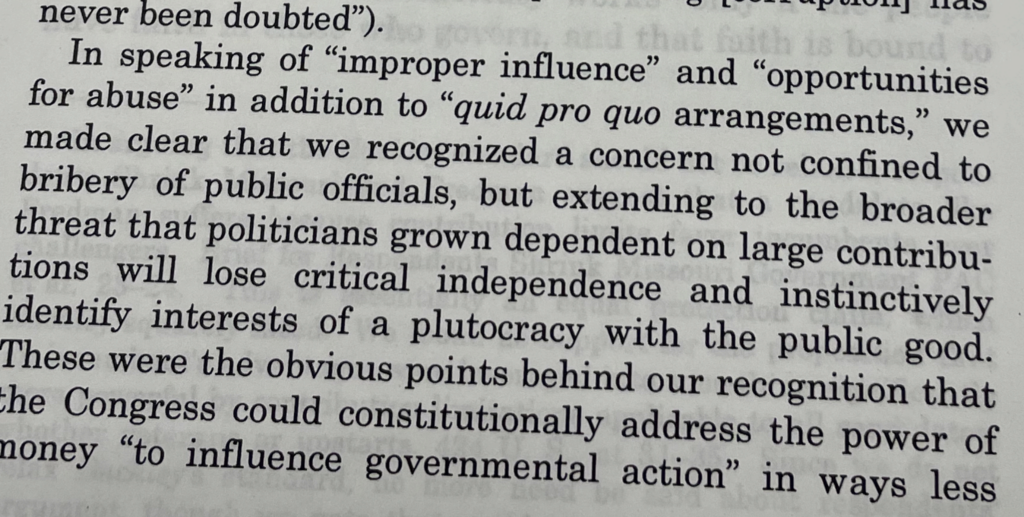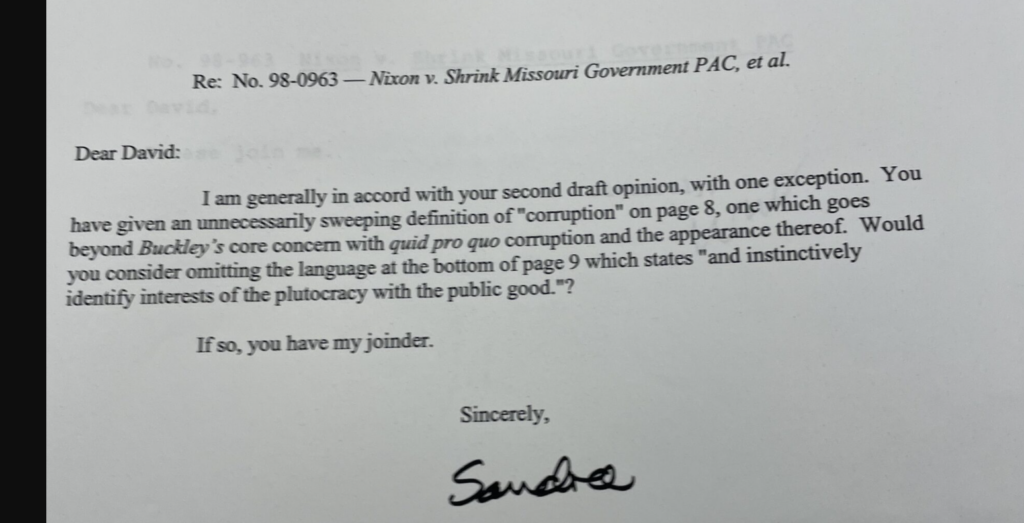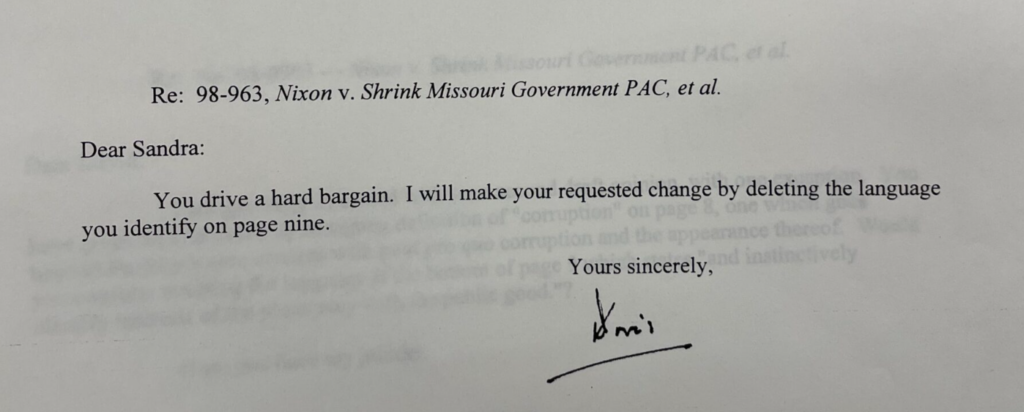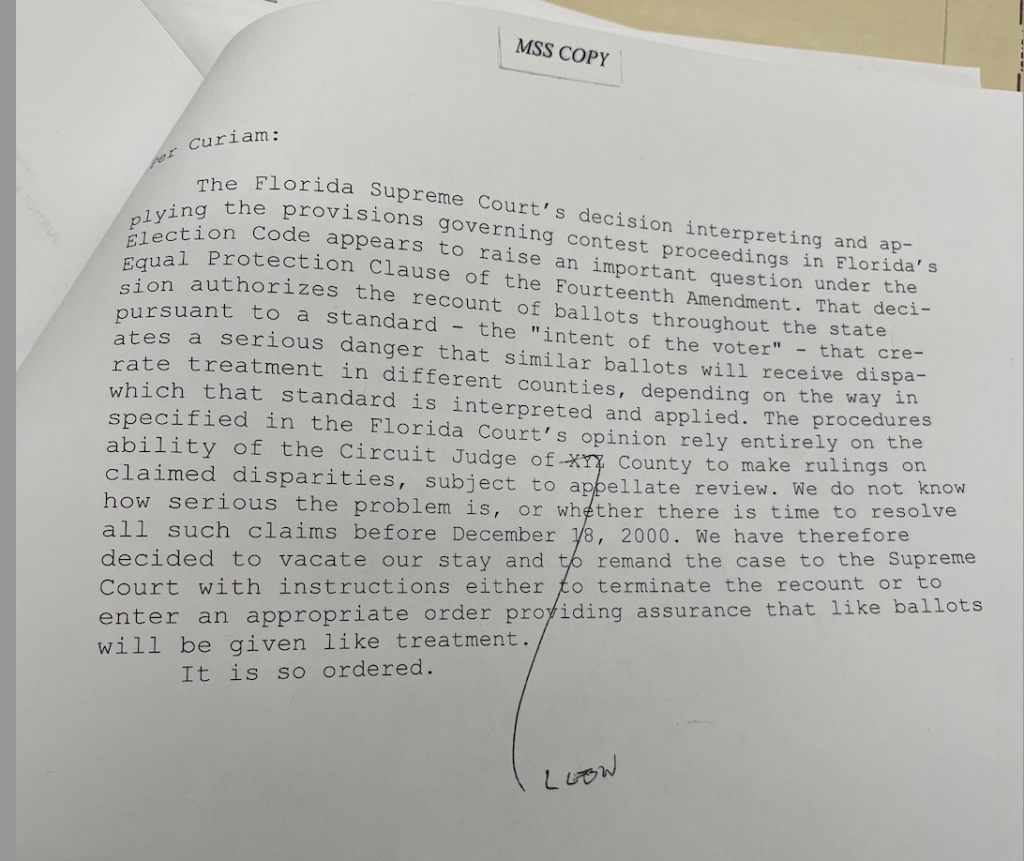This relates to the effort of some election officials to require a hand count of the 2022 ballots in Cochise County, AZ, despite the legal conclusions of the relevant county election lawyers that such a hand count would be illegal under state law. Lisa Marra, former Cochise County Elections Director, argued she was constructively discharged from her position, after she refused to participate in a hand count, because other election officials created such a toxic work environment for her. Story here.
Monthly Archives: May 2023
Nevada Republican Party sues to stop from being forced to use a presidential primary instead of a caucus
A Nevada news outlet has the details here, and the news release from the Nevada Republican Party is here. It took me a while to find the complaint, which was filed in state court last week in a state jurisdiction that does not have electronic access. That complaint is here.
The complaint argues that the First Amendment protects the right of the state party to run a presidential delegate selection process as it sees fit, and the Nevada Republican Party (apparently) desires to hold caucuses. But the Nevada legislature two years ago approved a switch to a primary process in AB126. The Nevada Republican Party is suing to stop that.
The Supreme Court in 1981 offered a succinct, if somewhat messy, statement of the legal framework (which I highlighted during last year’s DNC calendar shuffle) in Democratic Party of the United States v. Wisconsin ex rel. La Follette:
The State has a substantial interest in the manner in which its elections are conducted, and the National Party has a substantial interest in the manner in which the delegates to its National Convention are selected. But these interests are not incompatible, and to the limited extent they clash in this case, both interests can be preserved. The National Party rules do not forbid Wisconsin to conduct an open primary. But if Wisconsin does open its primary, it cannot require that Wisconsin delegates to the National Party Convention vote there in accordance with the primary results, if to do so would violate Party rules.
States can, essentially, hold whatever presidential primaries they like, whenever they like, however they like. But the national party is not obligated to recognize the results ahead of the presidential nominating convention.
Nevada Republicans, then, are free to hold a nominating caucus at the time and place they want. The State of Nevada, however, is also free to hold a presidential primary. Voters who participate in that primary may not affect the outcome of the selection of delegates–essentially, a “beauty contest.”
This is hardly novel. In 2016, for instance, Bernie Sanders won the Washington caucus–which was a step in sending delegates to the Democratic national convention–while Hillary Clinton later that year won the Washington presidential preference primaries–which were non-binding and had no formal outcome on the process.
Now, AB126 provides, “Any rules or regulations of the party governing the election of delegates and alternates to the national convention of the party, or directing the votes of delegates at the national convention must reasonably reflect the results of the presidential preference primary election, if one has been held for the party.” That is clearly unenforceable against the Nevada Republican Party per Democratic Party v. Wisconsin. (UPDATE: It appears that this provision was then repealed by SB292 months after it was enacted, so it’s not clear that there’s much left to this suit….)
So, the complaint (which could be removed to federal court as it is a First Amendment issue, although perhaps the Secretary of State chooses not to do so) could succeed in seeking injunctive relief or a writ of prohibition. That is, under on-point Supreme Court precedent, the State of Nevada cannot force the party to accept the results of a presidential primary. (Now, that being said, the complaint is fairly imprecise and does not exactly identify what the party wants to see enjoined, speaking more abstractly elsewhere about being “force[d] . . . to use a state-run primary.” The state can still hold a primary per Democratic Party v. Wisconsin.)
On the declaratory relief front, the plaintiff may fare slightly better. The Nevada Republican Party wants a declaration that the party is free to use a caucus system or that primary results are not binding.
One wrinkle to any relief, however: the complaint does not say that the Nevada Republican Party has committed to any particular presidential delegate selection process for 2024. That may mean that the complaint is not ripe for adjudication, as it is possible that the party chooses to use the primary process, and there is no legal conflict if that happens. It seems to want a declaration that it is free to do what it wants without formally indicating that it does not want a primary.
Finally, there are some “conventional wisdom” political ideas floating about that suggesting an intra-party feud, too–the conventional wisdom being, Donald Trump may fare better a smaller event with the most “die hards” in attendance, whereas a (closed) primary election that brings more Republican voters into the selection process will be to his detriment. It’s not clear whether that’s the motivation, or whether that would be the actual effect. And even here, many Republicans in the Nevada legislature favored AB126–this bill was not along starkly partisan lines. But it also highlights potential internal divisions about what process should be used.
In 2004 Partisan Gerrymandering Case, Justice Scalia Originally Had a Majority with J. Kennedy Joining, and J. Souter Was Going to Concur in the Judgment Not Dissent
I did not have time when I was at the Library of Congress looking at Justice Stevens’ papers to give a close read to the file in Vieth v. Jubelirer, a 2004 partisan gerrymandering case. In that case, four Justices, led by Justice Scalia, took the view that such claims were not justiciable (that is, could not be heard) in federal courts. [This is the position that the Supreme Court eventually took in the 2019 Rucho case.] Four Justices, including Justice Souter, dissented. Justice Kennedy agreed with the Scalia group that the standards for policing partisan gerrymandering put forward by the dissenters did not work. But he disagreed with Scalia about non-justiciability, believing the issue should percolate longer. Scalia’s opinion was not for the Court, but a plurality opinion joined by 3 other justices.
In the file, I found that Scalia originally was writing a majority opinion for the Court, with Kennedy joining Scalia, Thomas, Rehnquist, and O’Connor. Between the 4th and 5th drafts, Kennedy advanced his lone view to keep the issue open but not embrace any standards. That 5th draft was still called a majority opinion, but Scalia began attacking Kennedy’s position in that draft.
Also, interestingly, Justice Souter began his dissent as an opinion concurring in the judgment, drawing a distinction between statewide claims and district by district claims.
I’m sure there’s a lot more to do with this file for someone who has time. You can find the selected documents I copied at this link.
Sending Healing Thoughts and Strength to Gerry Hebert
Our friend Gerry Hebert, with a long and distinguished career in voting rights at the Department of Justice and at the Campaign Legal Center (not to mention his role as “Bailout King“), is ill with brain cancer. Jerry is a very fine lawyer and teacher, and an even finer human being. I wish him a full and speedy recovery so that he can get back to mentoring the next generation of voting rights lawyers.
I learned of Gerry’s illness when I spoke to him yesterday, and he told me how much he appreciates all of the words of encouragement that have been sent his way during his treatment. You can learn more about Gerry’s progress and condition by reading his latest Caring Bridge entry.
We wish you all the best Gerry!
“Opinion: The Supreme Court was enabling corruption well before the Clarence Thomas scandal”
Ciara Torres-Spelliscy with her views on this in the LA Times:
The Supreme Court recently reversed the conviction of a onetime aide and campaign manager for disgraced former New York Gov. Andrew Cuomo. The decision may have surprised those who follow Albany’s culture of corruption, but it was thoroughly in keeping with the recent history of the Supreme Court. The Roberts court has been busy deregulating corruption for over a decade.
The court’s own ethics have come under renewed scrutiny lately thanks to revelations about Justice Clarence Thomas, among others. What’s less widely appreciated is the court’s accumulating record of making political corruption easier to engage in and harder to prosecute….
In the New York case, meanwhile, the justices relied on the fine distinction that most of Percoco’s malfeasance occurred during a brief interregnum between stints in state government, while he was working on Cuomo’s reelection campaign as a technically private citizen. The court wrote that “the intangible right of honest services … plainly does not extend a duty to the public to all private persons.”
With the next presidential contest gearing up, the Percoco ruling could further embolden unscrupulous campaign managers and aides. After all, the front-runner for the Republican nomination has already seen two former top campaign officials, Paul Manafort and Steve Bannon, charged with federal crimes — and pardoned both of them. The Roberts court’s continuing campaign to excuse corruption by other means is bad for our democracy.
“Texas AG Says Trump Would’ve ‘Lost’ State If It Hadn’t Blocked Mail-in Ballots Applications Being Sent Out”
From Newsweek:
Texas Attorney General Ken Paxton, a Republican, said former President Donald Trump would have lost in Texas in the 2020 election if his office had not successfully blocked counties from mailing out applications for mail-in ballots to all registered voters.
Harris County, home to the city of Houston, wanted to mail out applications for mail-in ballots to its approximately 2.4 million registered voters due to the COVID-19 pandemic. However, the conservative Texas Supreme Court blocked the county from doing so after it faced litigation from Paxton’s office.
“If we’d lost Harris County—Trump won by 620,000 votes in Texas. Harris County mail-in ballots that they wanted to send out were 2.5 million, those were all illegal and we were able to stop every one of them,” Paxton told former Trump adviser Steve Bannon during the latter’s War Room podcast on Friday.
“Justice and Trump with Commanding Early Leads in West Virginia”
Here: “In a hypothetical 2024 U.S. Senate matchup in West Virginia, the latest ECU Poll shows Governor Jim Justice with a significant 22-point lead over incumbent Senator Joe Manchin, 54% to 32%, among registered voters in the state (with 13% undecided).”In a hypothetical 2024 U.S. Senate matchup in West Virginia, the latest ECU Poll shows Governor Jim Justice with a significant 22-point lead over incumbent Senator Joe Manchin, 54% to 32%, among registered voters in the state (with 13% undecided).”
“What Happens When the President Calls You an “Enemy of the People?” Election Officials and Public Sentiment”
New academic article in the Election Law Journal. From the abstract:
False information about the legitimacy of recent American elections has prompted a barrage of harsh rhetoric against the officials who administer them. This spike in negativity, largely occurring through social media, is driving people out of these essential jobs. This article measures the extent of this negativity, how it has trended over time, which state administrations are targeted by it most, and what sorts of accounts are sending it. By collecting every reply to any Twitter account managed by the agency or person officially responsible for administering a state’s elections, we show that the usage of keywords related to election fraud has spiked in recent years, while the sentiments of the replies have grown almost universally harsher. While left-leaning repliers are usually negative towards Republican officials, and vice versa, some officials have begun to receive negative replies from both the left and right, with sustained pile-ons led almost entirely by right-leaning repliers.
“Nevada becomes latest to enhance penalties for election worker intimidation after statewide exodus”
Those who harass, intimidate or use force on election workers performing their duties in Nevada could soon face up to four years in prison under a new law signed by the Western swing state’s Republican governor on Tuesday.
The law is meant to deter attacks against those in state and local election offices who have faced increased scrutiny for doing their jobs, Democratic Secretary of State Cisco Aguilar said Tuesday. Threats and initimidation of election workers had ramped up significantly in Nevada and across the country amid falsehoods and conspiracy theories about foul play denying former President Donald Trump victory in the 2020 presidential race.
Other states have taken similar steps to better protect election officials in recent years, including Maine, Vermont, Washington, New Mexico and Oklahoma.
“What a New Democratic Map in New York Could Look Like”
From David Wasserman at Cook (paywalled):
There’s already buzz that Albany Democrats, if given the chance, could opt for a “safer play” than the map they pursued in 2022, targeting five or six GOP incumbents who are already at varying degrees of risk in 2024. That could mean a 20D-6R or 21D-5R map — not quite as ambitious as the 22D-4R gerrymander that backfired in court, but enough to offset North Carolina and keep Democrats in close contention to make Jeffries speaker.
Part of Democrats’ calculus is legal: a subtler, less brazen gerrymander could give Court of Appeals judges more rationale to uphold it. For example, no more crazy S-shaped tentacles allowing liberal Park Slope to be folded in with Trump-loving Staten Island.
But part of Democrats’ calculus is political: the red tide in New York was so much stronger than anticipated that it likely would have defied Democrats’ original 22D-4R gerrymander.
“White House press shop adjusts to proliferation of AI deep fakes”
When an image showing what looked to be a bombing at the Pentagon started to spread online last week, the stock market dipped momentarily. Kayla Tausche, who covers the White House for CNBC, quickly started fact checking. Popping into Lower Press — the cluster of desks and offices behind the briefing room where many press aides work — she found principal deputy press secretary Olivia Dalton and asked about the reports.
Once additional tweets suggested the phony image had been generated by artificial intelligence, Tausche followed up with Dalton to apologize for the diversion.
“She said, with visible frustration, that she is dealing with these types of inquiries on a daily basis, with greater and greater frequency,” Tausche added.
“There was initially confusion about where it was coming from (I said ‘RT-style unconfirmed viral accounts’) and then exasperation,” Tausche told West Wing Playbook.
“Budget deal shows Alaska is already reaping ranked choice’s rewards”
An op-ed from David Lublin, Glen Wright, and Benjamin Reilly in the Anchorage Daily News:
They did it. Alaska’s budget, which passed the Legislature last week, was a classic political compromise, with a smaller divided check than many would have liked but larger spending on education and other public goods the state clearly needs…
The return to normalcy was based around the resurrection of cross-party coalitions in both the Senate — the key mover in budget negotiations — and the House. Compromise came before party loyalty. In the Senate, Republicans joined with Democrats to form a strong supermajority caucus….
Party primaries in the past decade increasingly saw more extreme candidates defeat more mainstream candidates….
Our research suggests that Alaska’s new final-four election system — a single-vote primary for all voters to select up to four candidates, followed by a ranked-choice vote general election — has helped arrest these trends in Juneau and maybe even reverse them….
But it has released legislators from being hostage to the party primary while allowing more voters to influence election outcomes and giving them a greater range of choices.
My New One at Slate on How Justice Souter Wanted to Warn in Campaign Finance Opinion About the Danger of “Plutocracy” until Justice O’Connor Shut Him Down
I have written this piece at Slate. It begins:
More than 20 years ago, then-Supreme Court Justice David Souter tried to warn that big money in politics risked turning United States officials into tools of an emerging “plutocracy.” We now know from recently-released case files that Souter had to strike the language in his draft Supreme Court opinion in a 2000 campaign finance case, Nixon v. Shrink Missouri Government PAC, as the price to secure Justice Sandra Day O’Connor’s vote. It’s too bad, because Souter’s warning is one that American political leaders, including justices on the Supreme Court itself, needed to hear. That warning was never made and thus never heeded. Today, American plutocracy—from Congress to inside the walls of the court itself—is alive and well.
Justice Souter was one of the most important, if underrated, voices among Supreme Court justices on questions of money in politics. His opinion in Shrink Missouri and similar cases in the early 2000s offered a jurisprudence of the First Amendment that is so different from the current Citizens United-fueled era in which limits on money in politics are mostly meaningless.
More than 20 years ago, then-Supreme Court Justice David Souter tried to warn that big money in politics risked turning United States officials into tools of an emerging “plutocracy.” We now know from recently-released case files that Souter had to strike the language in his draft Supreme Court opinion in a 2000 campaign finance case, Nixon v. Shrink Missouri Government PAC, as the price to secure Justice Sandra Day O’Connor’s vote. It’s too bad, because Souter’s warning is one that American political leaders, including justices on the Supreme Court itself, needed to hear. That warning was never made and thus never heeded. Today, American plutocracy—from Congress to inside the walls of the court itself—is alive and well.
Justice Souter was one of the most important, if underrated, voices among Supreme Court justices on questions of money in politics. His opinion in Shrink Missouri and similar cases in the early 2000s offered a jurisprudence of the First Amendment that is so different from the current Citizens United-fueled era in which limits on money in politics are mostly meaningless.
Writing in Shrink Missouri, Souter opined that limits on huge donations were essential to a functioning democracy and the public’s confidence in it: “Leave the perception of impropriety unanswered, and the cynical assumption that large donors call the tune could jeopardize the willingness of voters to take part in democratic governance.” This was an important warning, but Souter wanted to go much further. Souter’s original note of caution, not previously reported to my knowledge, was that there existed “broader threat that politicians grown dependent on large contributions will lose critical independence and instinctively identify interests of a plutocracy with the public good.” Tragically, this is very much what has happened in the years since the Supreme Court’s balance of power shifted when Justice O’Connor retired in 2006 and the Citizens United era ushered in a new gilded age….
An early draft of Justice Souter’s majority opinion in Shrink Missouri sought to expand the definition of corruption to include concepts of political equality. After quoting Buckley about the dangers of “improper influence” and “opportunities for abuse” that justified some campaign finance limits, Souter’s Shrink Missouri draft explained that in Buckley the court “made clear that we recognized a concern not confined to bribery of public officials, but extending to the broader threat that politicians grown dependent on large contributions will lose critical independence and instinctively identify interests of a plutocracy with the public good.”

Unfortunately, Justice Souter’s warning of an emerging plutocracy never made it into the final version of Shrink Missouri. O’Connor complained about the line, calling it an “unnecessarily sweeping definition of ‘corruption’ … one which goes beyond Buckley’s concern with quid pro quo corruption and the appearance thereof.” Justice Souter agreed to remove the line, remarking to O’Connor: “You drive a hard bargain.” The new language more meekly described the broader threat of big money as “politicians too compliant with the wishes of large contributors.”

The omission was unfortunate because Souter’s original insight was profound and surely right. When politicians spend all their time around the super-wealthy and depend upon their support, they will increasingly identify with their interests and values. And this is as true of Justice Clarence Thomas and his benefactor Harlan Crow as it is all of the presidential candidates that now depend upon megadonors to fund super PACs to support their campaigns…

Justice Stevens (or Someone Else) Drafted a Proposed Remand Order in Bush v. Gore That Would Have Kept the Chances for a Recount Alive
Joan Biskupic and Derek Muller have covered the most important news I saw in Justice Stevens’ Bush v. Gore files: that the Article II (independent state legislature theory) emanated from Justice O’Connor, not Chief Justice Rehnquist, and that Justice O’Connor inexplicably abandoned the argument. As I saw in Justice Stevens’ notes, the Article II argument was originally in the per curiam opinion, but the Chief Justice stripped it out when Justice Kennedy said he would not join.
But I did also come across this draft per curiam order in Justice Stevens’ file, which indicates that someone (I think Justice Stevens, because of the handwritten correction) wrote up a proposed order that would have at least kept open the possibility of a recount of Bush and Gore ballots under a uniform standard set by the Florida Supreme Court to be done within six days of the order.

Note the reference at the end of the proposed order to uncertainty as to “whether there is time” to resolve claims about uniform standards “before December 18, 2000,” and with instructions to the Florida Supreme Court “either to terminate the recount or to enter an appropriate order providing assurance that like ballots will be given like treatment.”
I don’t know from my quick review of the file if this was circulated to any other Justices, but I did not see any such indication in the file.